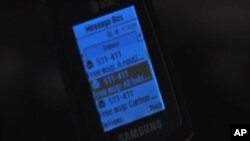Amnesty International has criticized the Obama administration for failing to address the high rate of infant mortality in the U.S. The U.S. rate is higher than 40 other nations, which Amnesty calls deplorable and disgraceful. However, recently, the U.S. government and dozens of organizations have come together to provide prenatal health tips and baby care information for free, using innovative technology called Text4Baby.
Like many young Americans, Lorielle Jones loves sending messages on her mobile phone. "It's always with you, it always gives you this information," she says.
As a new mother to four month old baby Jah'Tae, Jones now receives free messages from Text4Baby, a partnership established by the Obama administration, the technology firm Voxiva and more than 100 other companies and organizations.
The messages address everything from setting up a nursery to vaccination reminders.
"Here's a message from Text4Baby that I got the other day. Delivering early is only wise if your doctor says you need to," says Paul Meyer, the chairman of Voxiva, a technology company behind Text4Baby. With a pregnant wife - he says he knows first hand that it helps to have useful information at the right time. "We deliver messages that are tied to the due date (of the baby's birth) so the information that you receive at week 34 is relevant to what's happening to you at week 34. So, it's something that you can do with text messages, because we control when we send out the messages, that you can't do from a Website or a book," he says.
More than half a million babies are born prematurely in the United States each year - before 37 weeks of gestation. These babies often have significant health problems.
The Obama administration's Chief Technology Officer, Aneesh Chopra, says technology may help solve the problem. "The ultimate goal is to make sure that we reduce infant mortality -- that we increase the health of the children and the mothers through pregnancy. But from a technology standpoint, we're also trying to understand, 'Is this a better methodology of communicating and outreach? Does this model work in the delivery of education?'"
In the U.S., 83 percent of adults have a cell phone and it's usually on, while the average American spends less than two hours per day on the Internet. Text4Baby is working for new mother Lorielle Jones.
She likes the fact that the messages make it easy to get more information, providing phone numbers as well. "I was hoping that it can go on after he's one (year old) but, I think as of now the service only goes up until your child is one. But I wish they could send you things when they are like two or three-year-olds to do, y'know, things to help you out."
Mobile health has show it works in other countries and the goal is to repeat that success in the U.S. In the first few weeks of operation, more than 20-thousand American women signed up for Text4Baby.
Text4Baby Offers Prenatal Health Tips, Baby Care to New Mothers in US




